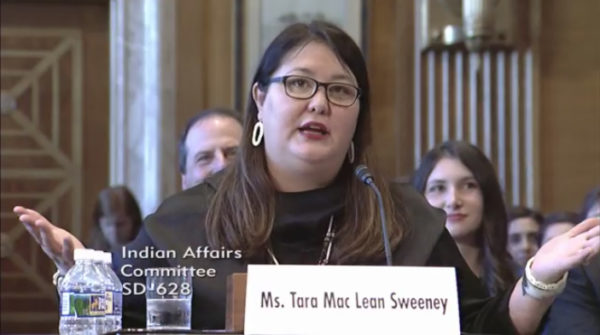
- Details
- By Levi Rickert
WASHINGTON — In an exchange of words on Twitter Thursday, Sen. Minority Leader Chuck Schumer (D–N.Y.) and Department of the Interior Assistant Secretary Tara Sweeney sparred over $8 billion that Congress designated for American Indian tribes in the CARES Act.
Tribes throughout Indian Country have been incensed by a decision to include Alaska Native Corporations (ANCs) in the funding package.
On Tuesday, the Great Plains Tribal Chairmen’s Association called for Sweeney’s removal, accusing her of diverting emergency Tribal Government resources to state-chartered, for-profit corporations owned by Alaska Native shareholders. Sweeney is an Alaska Native and former executive at Arctic Slope Regional Corporation, an ANC based in Utqiagvik.
Schumer weighed in on the burgeoning controversy on Twitter Thursday morning, tweeting: “Pres. Trump’s @ASIndianAffairs Tara Sweeney is diverting funds for tribal governments during coronavirus to for-profit Alaska Native Corporations. We can’t put these corporations before tribal governments & people. Sweeney used to be an exec for an ANC, and she wants to profit!”
https://twitter.com/asindianaffairs/status/1250867270525636610?s=21
A few hours later, Sweeney sent back a retort to the Senate Minority Leader:
“@SenSchumer Even for you, this is an ignorant and despicably low attack that could not be further from the truth. Perhaps you should read the law you negotiated and voted for as Alaska Natives are entitled to receive the funding from @USTreasury. bia.gov/covid-19/cares…”
A distinction should be noted that Sen. Schumer used the term Alaska Native Corporations in his tweet. Asst. Sec. Sweeney uses Alaska Natives in her Tweet.
Earlier on Thursday, a spokesperson for Republican Lisa Murkowski, the senior Senator from Alaska, responded to an email inquiry from Native News Online about ANCs eligibility to receive part of the $8 billion set aside for tribes.
“Senator Murkowski knows the law is clear and that ANCs are eligible for that funding. She has been disappointed by the personal attacks and baseless allegations that have been leveled in the media in recent days. It was the Alaska Congressional Delegation that fought alongside others in Congress to ensure there was a tribal set-aside at all and Senator Murkowski urges people to combat this crisis together instead of tearing each other down,” the statement reads.
One former Indian Affairs employee weighed in early Thursday evening.
"During this worldwide crisis, it is time to rise above the politics for the welfare of Indian Country. It saddens me to hear of accusations that our highest federal official for Native Affairs has made comments that has split our community. Her tweet is even more concerning because she wishes to engage in Twitter war instead of reaching across the branches of government and the political aisle to have a productive conversation on how to save lives. Our trustee is failing us," the former Indian Affairs employee told Native News Online.
More Stories Like This
Native News Weekly (August 25, 2024): D.C. BriefsUS Presidents in Their Own Words Concerning American Indians
Two Murdered on Colville Indian Reservation
NDAA passes House; Lumbee Fairness Act Advances
NFL, Vikings to Host Native All-American Game, Youth Flag Clinic
Help us defend tribal sovereignty.
At Native News Online, our mission is rooted in telling the stories that strengthen sovereignty and uplift Indigenous voices — not just at year’s end, but every single day.
Because of your generosity last year, we were able to keep our reporters on the ground in tribal communities, at national gatherings and in the halls of Congress — covering the issues that matter most to Indian Country: sovereignty, culture, education, health and economic opportunity.
That support sustained us through a tough year in 2025. Now, as we look to the year ahead, we need your help right now to ensure warrior journalism remains strong — reporting that defends tribal sovereignty, amplifies Native truth, and holds power accountable.
 The stakes couldn't be higher. Your support keeps Native voices heard, Native stories told and Native sovereignty defended.
The stakes couldn't be higher. Your support keeps Native voices heard, Native stories told and Native sovereignty defended.
Stand with Warrior Journalism today.
Levi Rickert (Potawatomi), Editor & Publisher

